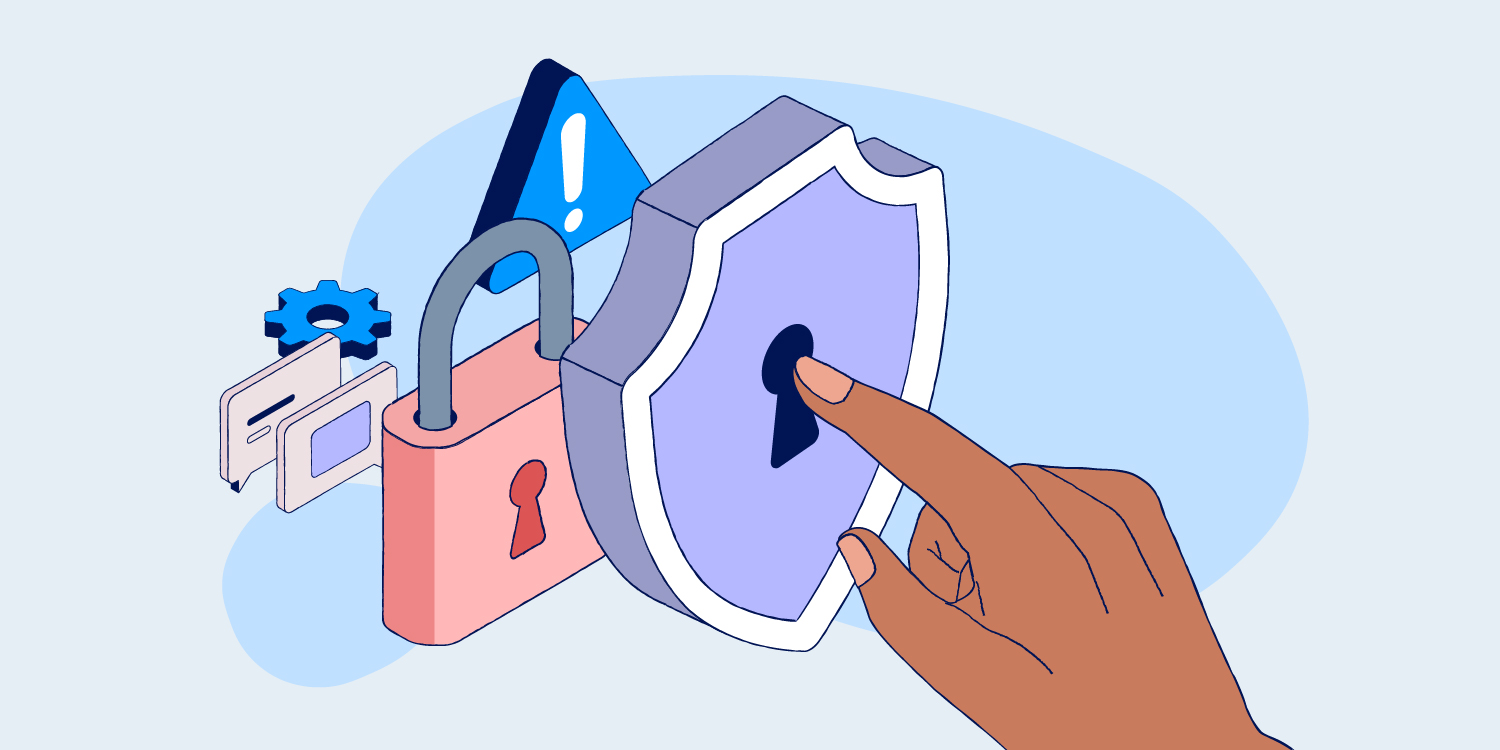Table of contents
Editor's note:
Data is everywhere, in your phone, at the doctor’s office, and in the apps your company uses. But not all data is the same, and not all uses are harmless. Every time you go online, whether to sign up for a newsletter or just browse and look up answers, you leave a digital footprint. This digital footprint could be used to identify you.
The Cisco Consumer Privacy Survey of 2024 shows that 53% of consumers are now aware of data privacy laws in their country, with 75% of these consumers prioritising privacy when making purchasing decisions.
In this blog post, we’ll show you what personal and organisational data privacy means, why collecting less is often smarter, what rights consumers have, and the importance of data privacy in building business products.
Personal vs. Organisational data privacy — What’s the difference?
Personal data or Personally Identifiable Information (PII) is any information that can be used to identify you as an individual, either directly or indirectly. It is any information that is private and specific to you. It includes the obvious details like your name, email address, and phone number, bank account details, even your pictures, biometric data, and even less obvious digital identifiers like your location, your computer's IP address, and your browsing history. This information paints a picture of who you are, and that’s exactly why it’s valuable. When exposed or misused, it can be exploited for scams, identity theft, or other malicious activities.
Organisational data, on the other hand, is any information that a company, institution, or agency creates, collects, or manages in the course of its operations. It represents the knowledge, activities, and assets that keep the organisation running. It includes their financial records, client data, employee information, internal strategies, sales figures, supply chain records, project documentation, internal procedures, etc. Some are sensitive, such as payroll information and client contracts, while other parts are public, like the company’s address or website content.
The key issue is how companies manage and protect your personal data once it’s in their systems. Regulations are in place to ensure that when a business collects and uses personal data, it does so responsibly. For instance, that shoe store you shared your email with for a discount now stores your information in its database. The difference lies in ownership and context. A small microfinance firm that keeps clients’ loan applications and credit histories on an unprotected office computer is putting personal data at risk. If that same computer also holds the company’s internal financial records and vendor details, that’s organisational data at risk. Both are valuable, but while personal data belongs to individuals, organisational data belongs to the company, and both need strong protection.
Privacy regulations and data accountability
Data is known to be the world’s most valuable resource. But bad actors can also misuse the same data that powers innovation, shapes business decisions, and connects people across the globe if left unprotected. That’s why privacy regulations exist: to make sure people and businesss handle personal information with care, use it responsibly, and never exploit it.
The European Union’s General Data Protection Regulation (GDPR)
The GDPR was adopted in April 2016, with a two-year transition period, then became enforceable on 25 May 2018. It replaced the 1995 Data Protection Directive (Directive 95/46/EC). It applies to any organisation (inside or outside the EU) that processes data of EU citisens. Its goal is simple but powerful: to give people more control over their data while holding companies accountable through strict rules and penalties.
Nigeria Data Protection ACT (NDPA)
The NDPA was signed into law in 2023, replacing the Nigeria Data Protection Regulation (NDPR), which was issued in 2019. The Act gives a more robust legal framework and aligns Nigeria’s laws with global best practices. It protects the personal data of Nigerians and regulates how organisations collect, store, process, and share that data. It establishes clear rules for data protection and ensures that Nigerian citisens have rights concerning their data.
Across Africa and around the world, privacy regulations are gaining strength. Countries such as South Africa (POPIA), Kenya (Data Protection Act 2019), Ghana (Data Protection Act 2012), and Rwanda (Data Protection and Privacy Law 2021) have enacted laws that set clear standards for how to handle personal data. The trend extends globally, with frameworks like Brasil’s LGPD, California’s CCPA, Japan’s APPI, and Singapore’s PDPA reinforcing one shared goal, which is to give people more control over their personal information and hold organisations accountable for how they use it.
These laws place a legal bind on service providers and companies that collect any form of data to protect it. Here’s a breakdown of how they do it:
1. Lawful and fair use
An organisation cannot just collect your data because it feels like it. They must have a specific, legal reason, known as a "lawful basis for processing." A company needs your permission to use your data and must tell you exactly what they'll use it for.
2. Clear and active consent
In the past, you might have seen websites with pre-ticked boxes that automatically signed you up for newsletters. That's no longer valid. For consent to be valid under GDPR and NDPR, it must be:
- Freely given: You can't be forced or unfairly tricked into giving it.
- Specific and Informed: The company must clearly explain what you are consenting to.
- A clear action: You have to take a clear step, like actively ticking an empty box or clicking an "I Agree" button.
3. Accountability and transparencyOrganisations must be open about their data practices, document how they handle information, and ensure proper safeguards such as encryption and limited access.
4. Breach notificationsIf an organisation suffers a data breach, the law requires them to report the breach to data protection authorities, often within 72 hours, and in serious cases, they must also inform the individuals affected.
Your rights as a data subject
These regulations grant individuals (also called data subjects) specific, enforceable rights over data. These are called data subjects’ rights, which have been highlighted in Articles 12–22 of the GDPR and Part VI of the NDPA. These include:
- Right to be informed: You have the right to know who is collecting your data, why, and how they will use it.
- Right of access: You can request to see what personal data an organisation holds about you.
- Right to rectification: You can correct inaccurate or incomplete data.
- Right to erasure: You can ask for the holder to delete it in certain situations, such as when they no longer need it.
- Right to restrict processing: You can limit the usage of your data while a dispute or verification is in progress.
- Right to data portability: You can obtain your data in a readable format and transfer it to another service.
- Right to object: You can say no to certain types of data use, like direct marketing or profiling.
- Right against automated decision-making: You can challenge significant decisions made solely by algorithms, such as loan rejections or job application outcomes.
Your data privacy responsibilities
- Review privacy settings: Most apps and websites have a "Privacy" or "Security" section in their settings menu. Take a few minutes to explore it. You can often control who sees your posts, your data usage for ads, and location sharing.
- Practice smart security hygiene: Your first line of defense is a strong password. Avoid simple, common phrases and use a unique password for each of your important accounts. Wherever possible, enable multi-factor authentication (MFA).
- Be mindful of what you share: Before you fill out a form or grant an app permission, pause and ask, "Is this information truly necessary for this service?" The less data you share, the less there is to protect.
- Question the excess: When a flashlight app requests access to your location, or a quis wants your contact list, pause and reflect on how necessary it is to the service the app is providing.
- Read before you accept: Even if it’s just a quick skim, take a moment to read privacy policies before you click “Accept.” It helps you understand what you’re agreeing to and how they’ll use your data.
9 data privacy practices for organisations to stay compliant
Data privacy is not just about following rules, but also about adopting smart practices to protect both the client and the business. Two of the most important practices are data minimisation and secure storage.
1. Data minimisation
Follow the principle of data minimisation by gathering only the information necessary for a specific purpose. For example, a company collecting emails for a newsletter does not need home addresses or next of kin details. The less data you hold, the lower the risk of misuse or exposure.
2. Store and secure data properly
Once collected, you must store the data safely. Use strong passwords, restricted access, and encryption so that even if there’s a system breach, the information remains unreadable. Always back up data to a secure and separate location.
3. Encrypt sensitive data in all states
Encryption shouldn’t stop at storage (at rest). You should also encrypt data in transit when it’s being shared between systems or departments. End-to-end encryption prevents interception, especially when employees work remotely or use shared networks.
4. Build privacy into design
Privacy by design means considering data protection from the start of every product, process, or system, rather than adding it later. This approach ensures privacy is an integral part of business operations.
5. Maintain clear retention policies
Establish clear data retention policies that define how long you store information and when you’ll delete or anonymise it. For instance, you may need to keep payroll data longer than marketing records. Removing unnecessary data reduces exposure and improves system performance.
6. Use data anonymisation techniques
Where possible, store or process data in a way that removes personally identifiable elements. This allows organisations to extract useful insights from information without compromising privacy.
7. Implement role-based access controls (RBAC)
Not every employee needs access to all information. Role-based access control ensures that data is available only to those who need it for their job, reducing internal risks and improving accountability.
8. Review and improve regularly
Conduct periodic data audits to identify what data you collect, where you store it, who can access it, and whether it is still needed. Audits also help confirm compliance with privacy laws such as the NDPA and GDPR.
9. Publish a clear privacy policy
Publish clear privacy notices that explain what data you collect, why you collect it, how long you keep it, and how people can exercise their rights. Offer easy ways for users to view, correct, or delete their personal data through simple forms or account settings.
Conclusion
For organisations, it reflects a commitment to integrity, accountability, and long-term sustainability. For individuals, it protects autonomy, identity, and security. Both have a part to play: organisations must handle data responsibly and keep it secure throughout its lifecycle, while individuals should stay informed, exercise their rights, and be mindful of what they share.
When both sides do their part, everyone benefits. Strong data privacy builds confidence, reduces risk, and creates a safer digital environment for all. Your data is valuable, and understanding how it’s used is one of the best ways to protect yourself online. Knowing your rights, as well as a company’s responsibilities, helps you make more informed choices about where and how you share personal information.









.png)



%201.png)
%201.png)

%201.svg)











%201.png)
%201%20(1).png)